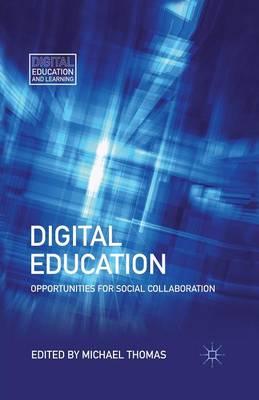Overview
A collection of content-based chapters and case studies examining the pedagogical potential and realities of digital literacies in education. The book aims to examine a number of foundational aspects of Web 2.0 technologies and social media applications and to understand the implications for teaching, learning, and professional development.
Full Product Details
Author: M. Thomas
Publisher: Palgrave Macmillan
Imprint: Palgrave Macmillan
Edition: 1st ed. 2011
Dimensions:
Width: 14.00cm
, Height: 1.50cm
, Length: 21.60cm
Weight: 0.454kg
ISBN: 9781349293827
ISBN 10: 1349293822
Pages: 281
Publication Date: 02 February 2011
Audience:
Professional and scholarly
,
Professional & Vocational
Format: Paperback
Publisher's Status: Active
Availability: Manufactured on demand

We will order this item for you from a manufactured on demand supplier.
Reviews
This volume is at once a wake-up call to 21st-century educators and an intriguing glimpse at possible futures for teaching and learning with digital technologies. -Kenneth Reeder, Professor, Department of Language and Literacy Education, the University of British Columbia Digital Education introduces a healthy corrective to exaggerated techno-optimism or techno-pessimism. The thought-provoking edited collection represents one of the first serious attempts to examine how Web 2.0 may not only improve but also help transform education. Contributors to the book bring a wide range of social theory to the task . . . And they apply this theory to examining incipient efforts to deploy Web 2.0 tools in a broad range of formal educational settings, especially at the tertiary and adult level. Chapters from and about Australia, Canada, Germany, Indonesia, South Africa, Spain, the UK, the US, and Venezuela result in a diverse international discussion that is not common in educational research, and this breadth helps us to better understand the relationship of theory to practice. . . . The contributions in this book represent an especially broad and thoughtful overview of where we have come on these issues and where we stand today. -Professor Mark Warschauer, University of California, Irvine
"""This volume is at once a wake-up call to 21st-century educators and an intriguing glimpse at possible futures for teaching and learning with digital technologies."" -Kenneth Reeder, Professor, Department of Language and Literacy Education, the University of British Columbia ""Digital Education introduces a healthy corrective to exaggerated techno-optimism or techno-pessimism. The thought-provoking edited collection represents one of the first serious attempts to examine how Web 2.0 may not only improve but also help transform education. Contributors to the book bring a wide range of social theory to the task . . . And they apply this theory to examining incipient efforts to deploy Web 2.0 tools in a broad range of formal educational settings, especially at the tertiary and adult level. Chapters from and about Australia, Canada, Germany, Indonesia, South Africa, Spain, the UK, the US, and Venezuela result in a diverse international discussion that is not common in educational research, and this breadth helps us to better understand the relationship of theory to practice. . . . The contributions in this book represent an especially broad and thoughtful overview of where we have come on these issues and where we stand today."" -Professor Mark Warschauer, University of California, Irvine"
This volume is at once a wake-up call to 21st-century educators and an intriguing glimpse at possible futures for teaching and learning with digital technologies. -Kenneth Reeder, Professor, Department of Language and Literacy Education, the University of British Columbia Digital Education introduces a healthy corrective to exaggerated techno-optimism or techno-pessimism. The thought-provoking edited collection represents one of the first serious attempts to examine how Web 2.0 may not only improve but also help transform education. Contributors to the book bring a wide range of social theory to the task ... And they apply this theory to examining incipient efforts to deploy Web 2.0 tools in a broad range of formal educational settings, especially at the tertiary and adult level. Chapters from and about Australia, Canada, Germany, Indonesia, South Africa, Spain, the UK, the US, and Venezuela result in a diverse international discussion that is not common in educational research, and this breadth helps us to better understand the relationship of theory to practice... The contributions in this book represent an especially broad and thoughtful overview of where we have come on these issues and where we stand today. -Professor Mark Warschauer, University of California, Irvine
Author Information
Michael Thomas is Associate Professor in Digital Education and Learning at the University of Central Lancashire, UK.




